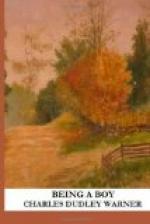Of course the perfectly good boy will always prefer to work and to do “chores” for his father and errands for his mother and sisters, rather than enjoy himself in his own way. I never saw but one such boy. He lived in the town of Goshen,—not the place where the butter is made, but a much better Goshen than that. And I never saw him, but I heard of him; and being about the same age, as I supposed, I was taken once from Zoah, where I lived, to Goshen to see him. But he was dead. He had been dead almost a year, so that it was impossible to see him. He died of the most singular disease: it was from not eating green apples in the season of them. This boy, whose name was Solomon, before he died, would rather split up kindling-wood for his mother than go a-fishing,—the consequence was, that he was kept at splitting kindling-wood and such work most of the time, and grew a better and more useful boy day by day. Solomon would not disobey his parents and eat green apples,—not even when they were ripe enough to knock off with a stick, but he had such a longing for them, that he pined, and passed away. If he had eaten the green apples, he would have died of them, probably; so that his example is a difficult one to follow. In fact, a boy is a hard subject to get a moral from. All his little playmates who ate green apples came to Solomon’s funeral, and were very sorry for what they had done.
John was a very different boy from Solomon, not half so good, nor half so dead. He was a farmer’s boy, as Solomon was, but he did not take so much interest in the farm. If John could have had his way, he would have discovered a cave full of diamonds, and lots of nail-kegs full of gold-pieces and Spanish dollars, with a pretty little girl living in the cave, and two beautifully caparisoned horses, upon which, taking the jewels and money, they would have ridden off together, he did not know where. John had got thus far in his studies, which were apparently arithmetic and geography, but were in reality the Arabian Nights, and other books of high and mighty adventure. He was a simple country-boy, and did not know much about the world as it is, but he had one of his own imagination, in which he lived a good deal. I daresay he found out soon enough what the world is, and he had a lesson or two when he was quite young, in two incidents, which I may as well relate.
If you had seen John at this time, you might have thought he was only a shabbily dressed country lad, and you never would have guessed what beautiful thoughts he sometimes had as he went stubbing his toes along the dusty road, nor what a chivalrous little fellow he was. You would have seen a short boy, barefooted, with trousers at once too big and too short, held up perhaps by one suspender only, a checked cotton shirt, and a hat of braided palm-leaf, frayed at the edges and bulged up in the crown. It is impossible to keep a hat neat if you use it to catch bumblebees and whisk ’em; to bail the water from a leaky




